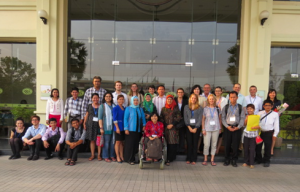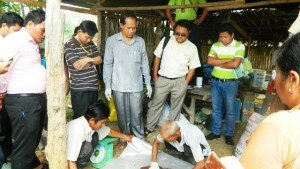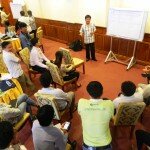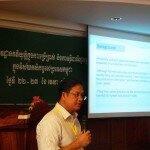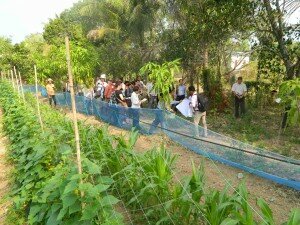Addressing the unsatisfactory delivery of public services: New National Program for Public Administrative Reform
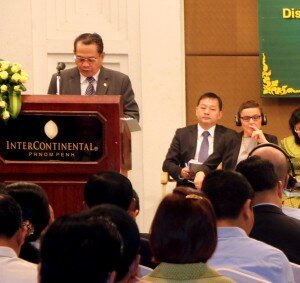
H.E. Minister Pech highlighting ambitious future activities of Public Administrative Reform in fields such as public services, gender, e-government, human resource management, training of civil servants and pay reform.
20 May 2015
Phnom Penh – Teachers conducting exams without asking for extra money, health stations opening for full days providing adequate services, ID cards being issued at no additional charge within a reasonable period of time – such are behaviours of the civil service desired by citizens and the vision of the Royal Government of Cambodia.
In January 2015, the National Program for Public Administrative Reform (NPAR) 2015-2018 was officially approved by the Council of Ministers. This came as a big milestone after the Royal Government of Cambodia had established the Ministry of Civil Service in late 2013 for the purpose of overseeing and reforming all matters related to the public service and its workforce. Having co-operated with the Ministry of Civil Service and its predecessor for five years through its “Decentralisation and Administrative Reform Programme” implemented by GIZ, Germany happily supported the drafting process of the new reform programme and its dissemination to all ministries and sub-national institutions.
On the 1st of April, some 500 civil servants from across the country and the capital gathered at the InterContinental Hotel in Phnom Penh. After welcoming remarks by H.E. Youk Bunna, Secretary of State at the Ministry of Civil Service, Ms Birgit Strube, First Secretary of the German Embassy, lauded the responsible authorities in the name of the development partners for their elaborate and ambitious outline of the reform. In her speech, she also mentioned a recent study on government openness with Cambodia ranking almost at the bottom (http://data.worldjusticeproject.org/opengov/#/groups/KHM), mainly due to the absence of effective feedback and complaint mechanisms for citizens. H.E. Minister Pech Bunthin, then, reiterated the urgency of the reform and the significance the government ascribes to it.
H.E. Kong Sophy, Director General for the Department of Civil Service Policy, presented the key pillars of the reform in depth. The fields of improving public service delivery, professionalising human resource management and development as well engaging in pay and remuneration reform were vividly communicated to the participants. At the same time he emphasised the supportive role of the Ministry of Civil Service and stimulated all institutions to kick-start their own reform processes. He also acknowledged the alarmingly low ranking of Cambodia in the above-mentioned study, and reaffirmed the political will of the government to address the root causes of these findings.
In the afternoon, sector ministries such as the Ministry of Health and the Ministry of Education, Youth and Sports highlighted ongoing reforms within their institutions. The workshop also provided a valuable opportunity for participants to directly ask questions to the Ministry of Civil Service. Concerns about the pace of reform, questions regarding its implementation, matters of integrity and complaints about bureaucratic burdens were raised and with great patience addressed by H.E. Youk Bunna. Eventually, H.E. Minister Pech Bunthin concluded the dissemination workshop highlighting ambitious future activities in fields such as gender, e-government, monitoring and evaluation, training of civil servants and pay reform. He also expressed his gratitude toward the German government and GIZ for their continued support and stated a strong interest in future Cambodian-German co-operation in public administrative reform.
![]()
GIZ Cambodia hosts the first regional workshop on economic inclusion of persons with disabilities
Phnom Penh, 21 March 2015. “Economic progress in the region in many cases lacks an enabling environment fostering the inclusion of persons with disabilities”, Mr Adelbert Eberhardt, Country Director of GIZ Cambodia opened the workshop titled ‘Bridging the gap between policy and practice – cross-sectoral innovations on economic inclusion of persons with disabilities’.
More than 30 experts from seven Asian countries came together in Phnom Penh from March 18-20 to discuss experiences and innovative approaches towards economic inclusion. For the first time, GIZ invited colleagues, partners and international experts to discuss the topic from a cross-sectoral perspective and to identify areas for intersectoral cooperation in the region.
“Collaborative partnerships are a key driver for a change process towards inclusion”, His Excellency Mr Em Cham Makara, Secretary General of the Disability Action Council in Cambodia, pointed out in his opening speech. This was taken up by Mr Patrik Andersson, Chief of the Social Integration Section at UNESCAP, who set the regional and thematic frame of the workshop. Health, social protection, vocational training and employment are essential sectors for strengthening the economic inclusion of persons with disabilities. Yet, access to these sectors and specific services remains limited due to prevailing stigma and discrimination. Participants shared the view that it is the exclusion of persons with disabilities which causes substantial costs for economies and leaves economic and social potential unused.
Based on the BMZ Action Plan on the Inclusion of Persons with Disabilities, Ingar Duering, Head of the GIZ Sector Initiative “Inclusion of Persons with Disabilities”, provided the participants with an overview of the current approach and related activities of German Development Cooperation. She emphasised that inclusion is a process that requires perseverance and joint efforts to guarantee sustainability.
Mr Hay Hunleng, representative of the National Employment Agency in Cambodia outlined current efforts in designing and offering matching services. Amongst others, a new job data base and support in recruitment processes aim to improve labour market access for persons with disabilities.
Following intensive and fruitful debates in sectoral working groups, participants discussed cross-sectoral approaches and future directions for the economic inclusion of persons with disabilities in a market place.
At the end of the workshop, lively exchange among experts from different sectors has created a first platform for the promotion of comprehensive inclusive approaches in GIZ’s partner countries. In order to enable further discussion and joint learning, similar exchange formats will be taken up in virtual technical forums in the future.
![]()
National Forum on Biological Control Agents shares success storiesy for sustainable agriculture in Cambodia
Introducing and promoting Biocontrol agents as an alternative to commonly used chemical agricultural inputs was at the core of the ‘National Forum on the regulation, trade and use of Biocontrol Agents (BCA) in Cambodian agriculture’ held from 22-23 April 2015 in Battambang, Cambodia.
The two-day workshop was hosted by the GIZ ASEAN Sustainable Agrifood Systems project (ASEAN-SAS) in collaboration with the USAID Cambodia HARVEST funded program and the Ministry of Agriculture, Forestry and Fisheries (MAFF). More>>>
National Forum on Biological Control Agents shares success storiesy for sustainable agriculture in Cambodia
Introducing and promoting Biocontrol agents as an alternative to commonly used chemical agricultural inputs was at the core of the ‘National Forum on the regulation, trade and use of Biocontrol Agents (BCA) in Cambodian agriculture’ held from 22-23 April 2015 in Battambang, Cambodia.
The two-day workshop was hosted by the GIZ ASEAN Sustainable Agrifood Systems project (ASEAN-SAS) in collaboration with the USAID Cambodia HARVEST funded program and the Ministry of Agriculture, Forestry and Fisheries (MAFF).
An actual body of evidence for advantages of biological agricultural practices, such as higher yields, increased income opportunities, and improved health indicators were presented from BCA field trials by Dr. Kean Sophea from the General Directorate of Agriculture, Ms. Elodie Schoenmakers from Charlemagne High Education Institute, Mr. Melvin Medina from Cambodia HARVEST, and Mr. Sip Pagnasoley from University of Battambang.
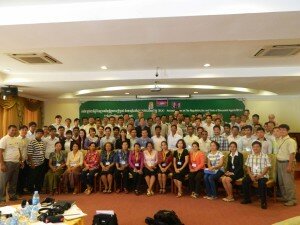 Regional GIZ expert Dr. Thomas Jaekel presented on the economic benefits arising from the use of BCA highlighting that “farming is a business” opportunity for smallholders.
Regional GIZ expert Dr. Thomas Jaekel presented on the economic benefits arising from the use of BCA highlighting that “farming is a business” opportunity for smallholders.
From the government side, Mr. Pum Ra from Department of Agricultural Legislation (DAL) provided an overview of the ongoing process of implementing the ASEAN Guideline in Cambodia to regulate the use and trade of BCA products, jointly carried out with GIZ ASEAN-SAS and Cambodia HARVEST.
Among the more than 110 participants were representatives of the General Directorate of Agriculture (GDA), Department of Agricultural Legislation (DAL), International organizations, various farmer and rural development NGOs, farmer cooperatives, the University of Battambang (UBB), and numerous agricultural input companies committed to the commercial production and distribution of BCA.
Some selected forerunners among the companies displayed their products – mainly organic fertilizers and bio-pesticides, seeds, irrigation schemes, and organic groceries – to potential customers and cooperation partners throughout the duration of the workshop. Altogether, the national forum provided a beneficial platform for a broad range of actors to identify entry points of cooperation and push forward the rollout of BCA throughout Cambodia.
Author: Benjamin Scholz
![]()
